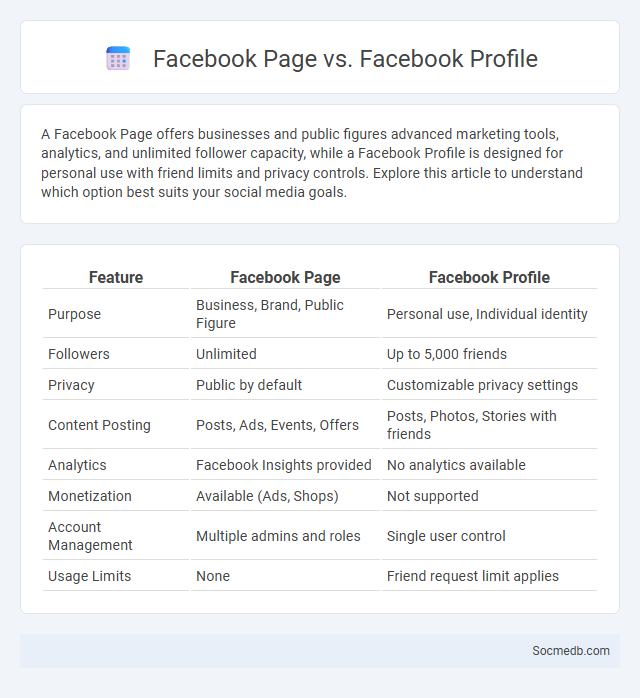
Photo illustration: Facebook Page vs Facebook Profile
A Facebook Page offers businesses and public figures advanced marketing tools, analytics, and unlimited follower capacity, while a Facebook Profile is designed for personal use with friend limits and privacy controls. Explore this article to understand which option best suits your social media goals.
Table of Comparison
| Feature | Facebook Page | Facebook Profile |
|---|---|---|
| Purpose | Business, Brand, Public Figure | Personal use, Individual identity |
| Followers | Unlimited | Up to 5,000 friends |
| Privacy | Public by default | Customizable privacy settings |
| Content Posting | Posts, Ads, Events, Offers | Posts, Photos, Stories with friends |
| Analytics | Facebook Insights provided | No analytics available |
| Monetization | Available (Ads, Shops) | Not supported |
| Account Management | Multiple admins and roles | Single user control |
| Usage Limits | None | Friend request limit applies |
Understanding Facebook Page, Profile, and Group: Key Differences
Facebook Page serves as a public platform for businesses, brands, and public figures to connect with a broad audience through posts, promotions, and insights. Facebook Profile represents an individual's personal account, designed for connecting with friends and sharing personal updates, photos, and life events. Facebook Group facilitates community building by allowing members to interact, share content, and discuss topics within a more private or interest-based setting, often with controllable privacy settings.
Facebook Profile: Personal Use and Limitations
Your Facebook profile serves as a digital representation of your personal identity, allowing you to share photos, updates, and connect with friends and family. Privacy settings empower you to control who can see your posts and personal information, protecting your online presence from unwanted access. Limitations include restrictions on posting offensive content, age requirements, and potential exposure to data collection by third-party apps linked to your profile.
Facebook Page: Professional Branding and Public Presence
A Facebook Page serves as a powerful tool for professional branding and enhancing public presence, offering businesses and individuals a dedicated platform to showcase expertise, share industry-relevant content, and engage with a targeted audience. Strategic optimization of page elements such as profile visuals, about section, and consistent posting schedules increases visibility in Facebook's algorithm, driving organic reach and follower growth. Utilizing Facebook Insights, page admins can analyze audience demographics and engagement patterns to tailor content that strengthens brand authority and fosters community trust.
Facebook Group: Community Building and Member Interaction
Facebook Groups offer powerful tools for community building and member interaction by enabling targeted discussions and shared interests. You can foster engagement through regular posts, polls, and live events that encourage meaningful connections among members. Leveraging features like moderation controls and analytics helps maintain a vibrant, connected community aligned with your group's goals.
Advantages of Using Facebook Pages for Business
Facebook Pages offer businesses a powerful platform to build brand awareness and engage directly with a global audience through targeted content and advertising. The integrated analytics tools provide valuable insights into customer demographics and behavior, allowing businesses to optimize marketing strategies and improve ROI. Furthermore, Facebook Pages facilitate customer interaction and support, fostering loyalty and enhancing customer service responsiveness.
Features Exclusive to Facebook Profiles
Facebook profiles feature My Day, a temporary status update visible for 24 hours to selected friends, enhancing personal expression and engagement. Unique social plugins like Friend Lists organize contacts for tailored content sharing, boosting privacy and interaction relevance. The platform's extensive integration with third-party apps supports rich multimedia uploads, fostering diverse user experiences and seamless connectivity.
Comparing Engagement Options: Page vs Profile vs Group
Social media engagement varies significantly across pages, profiles, and groups, each offering unique interaction dynamics. Pages are ideal for brand promotion with broad public reach and analytic tools, while profiles facilitate personal connections and one-to-one interactions. Groups foster community building around shared interests, encouraging member participation and deeper engagement through discussions.
Privacy and Security: Which is Safer?
Social media platforms vary significantly in privacy and security features, with encrypted messaging apps like Signal offering stronger protection compared to mainstream platforms such as Facebook or Instagram. Users face risks including data breaches, phishing attacks, and unauthorized data sharing due to inadequate security protocols and lax privacy settings. Implementing two-factor authentication, regularly updating passwords, and customizing privacy settings are essential practices to enhance safety on social media networks.
Choosing the Right Option: When to Use Page, Profile, or Group
Selecting the right social media option depends on your goals: a Page is ideal for representing businesses or public figures to reach a broad audience, while a Profile suits personal branding and individual connections. Groups foster community engagement and interaction among members with shared interests, making them perfect for discussions and building loyal supporters. Understanding these distinctions helps You maximize visibility, engagement, and growth on platforms like Facebook and LinkedIn.
Common Mistakes and Best Practices for Facebook Usage
Many users make common mistakes on Facebook such as oversharing personal information, neglecting privacy settings, and engaging in excessive posting that can lead to audience fatigue. Best practices include customizing privacy controls to safeguard personal data, maintaining a consistent posting schedule with high-quality, relevant content, and actively engaging with followers through comments and messages to build community trust. Leveraging Facebook Insights for data-driven decisions enhances content effectiveness and audience reach.
 socmedb.com
socmedb.com